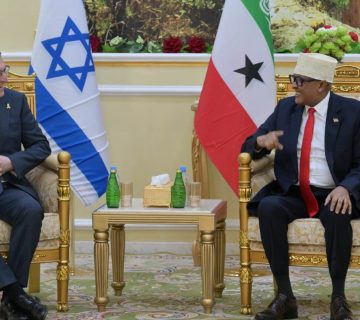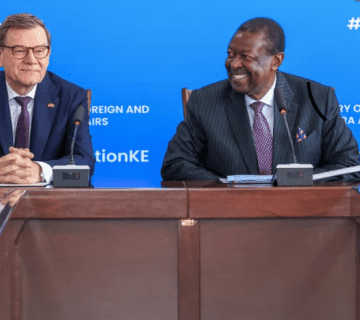Ugandan President Yoweri Museveni has in recent months strengthened his grip on the presidency. He has been in power since he won the Ugandan ‘bush’ war at the helm of the National Resistance Movement (NRM) against his predecessor Milton Obote in 1986. In the aftermath of the war, Museveni stated that he had no intentions of clinging to power, even arguing that ‘the problem of Africa in general and Uganda in particular is not the people but the leaders who want to overstay in power’. In his 2001 election manifesto, Museveni declared several times that he would contest for a last presidential term. Now, 18 years later, Museveni is still firmly in office, and recent developments further solidify his position.
Understanding Museveni’s Politics
Why exactly does Museveni wish to maintain power? Andrew Mwenda, Ugandan journalist for The Independent, and Roger Tangri, a British political scientist with an expertise on Uganda, discuss three reasons. First, coming to power against a backdrop of violence and chaos, Museveni believes he is indispensable for peace and prosperity in Uganda. Without the pacifying influence of a strong leader and a strong party (NRM), Uganda would descend into chaos. Second, executive power has brought many opportunities for accumulating wealth in a context of scarcity and limited opportunities. Holding on to executive power thus has a financial incentive. Third, Museveni, his family, and those around him, believe that a new government would take legal action against them for alleged misdoings. In 2001, when the presidential elections were hotly contested between Museveni and Dr. Kizza Besigye, the latter accused the president and his family of corruption and threatened judicial action against them. The 2001 election was a crucial moment for Uganda, any intention that Museveni had to give up power peacefully was shattered by the large electoral support for Besigye.
Over his 33-year tenure, Museveni has had to deal with several challenges to his rule. First, he inherited a fractured political landscape in the aftermath of the bush war with numerous political groups vying for control. Second, his strong political opponent, Dr. Kizza Besigye, petitioned the Supreme Court multiple times over alleged fraudulent elections (although the Supreme Court upheld all the petitioned presidential elections). Third, the Ugandan Constitution proved to be problematic in 2006 when Constitutional Presidential term limits effectively banned Museveni to run for presidency, and in 2018, when Article 102(b) prevented candidates above 75 years of age (and below 35 years) to run for the seat. Museveni turns 75 years in September 2019, which would ban him from running in 2021. Both Constitutional limits have since been lifted from the Ugandan Constitution. Fourth, resistance from within his own party, especially after the lifting of constitutional limits, proved to be a significant challenge to his power. In response to senior NRM leaders, Jim Muhwezi, Mike Mukula, and Henry Tumukunde’s rebellion (criticizing the president for weak leadership and persistent corruption), Museveni directed that they face trial on corruption-related charges. Finally, in 2009, Uganda was heavily dependent on foreign aid. Around 55 per cent of the government’s expenditure was gathered through aid programs. This meant that Museveni had to skilfully manage strong foreign ties with regional and international partners.
Long Stay in Power
Certain developments in recent months further demonstrate that Museveni is not planning to relinquish control anytime soon. First, he announced his intention to run in the presidential elections of 2021. During an inter-party dialogue summit in December 2018 in Kampala, which brought together leaders of parties represented in Parliament, Museveni told the leaders that if they are still thinking of him leaving State House soon, “they should better start dreaming of other alternatives”. Second, in February 2019 it became clear that the NRM supports his 2021 presidential bid, further solidifying his power within the party and the country. Third, in July 2018, Uganda imposed a ‘social media tax’, imposing UGX 200 on the use of social media. The BBC’s Catherine Byaruhanga reported that many in Kampala say the tax is politically useful as social media is often used for critical commentary about the government. Fourth, in February 2019, Museveni promoted his son Muhoozi Kainerugaba to the rank of Lieutenant General, the second highest rank in the Ugandan Army. Opponents of what has come to be known as the ‘Muhoozi Project’ in Uganda argue that Muhoozi’s rise through the army ranks should be seen as a way of grooming him to control the armed forces and eventually take over as head of state from his father. Finally, Museveni has proven a skilled diplomat over the years, courting the US and the UK to assist him with aid in return for counter-terrorism initiatives in Somalia and the wider Horn of Africa. Additionally, as is visible this week, Museveni has maintained and prioritized trade ties with regional power houses such as Kenya. To this extent, Museveni recently visited Kenyan counterpart Uhuru Kenyatta on March 27-28, 2019, to discuss trade deals and the Mombasa port.
Throughout the world, leaders are overstaying their terms (Latin America, North Korea, Algeria, Russia). However, the Council on Foreign Relations (CFR) reports that 15 leaders (monarchs not included) in Sub-Saharan Africa stayed in office for 25 years or longer between 1960 and 2019. Further, there exist strong correlations between Sub-Saharan Africa’s entrenched leadership and its developmental and security challenges, including conflict or instability, stagnant or declining economies, and democratic backsliding. The debate between strong institutions or strongmen is still raging, but one of the benefits of power transfers for democracy is evident: it keeps political officeholders on their toes, knowing that they could well be removed from office if they fail to govern properly. Barack Obama, former US President, stated during a speech before the African Union in 2015 that “when a leader tries to change the rules in the middle of the game just to stay in office, it risks instability and strife, as we’ve seen in Burundi. And this is often just a first step down a perilous path. And sometimes you’ll hear leaders say, ‘Well, I’m the only person who can hold the nation together.’ If that’s true, then that leader has failed to truly build their nation.”
Critical Role of the African Union
An important role in convincing long-sitting leaders such as Museveni to step down is reserved for the African Union (AU). In 2012, African countries adopted the African Union Charter on Democracy, Elections and Governance, which calls on its member states to identify illegal means of accessing power or staying in office, including refusals “to relinquish power after free, fair, and transparent elections” and constitutional amendments that infringe upon “the principles of democratic changes of power,” and sanction those responsible. However, just ten states have signed and ratified this charter, Uganda not being one of them. Additionally, the EU and the US have imposed sanctions on several African leaders to pressure them to step down, but Museveni is not one of them. Top-down regulation efforts, thus far, have not merited any substantial results. That is why Kealeboga J. Maphunye, a professor at the Department of Political Sciences of the University of South Africa (UNISA) argues that “it may be time for ordinary voters across the continent to begin to collaborate through non-governmental organizations and other cross-border institutional mechanisms to share experiences and begin to enforce durable continental democracy. Africa needs democracy from below.”
Jules Swinkels is a Visiting Research Fellow at the HORN Institute.
Photo Credit: Pearl Posts



